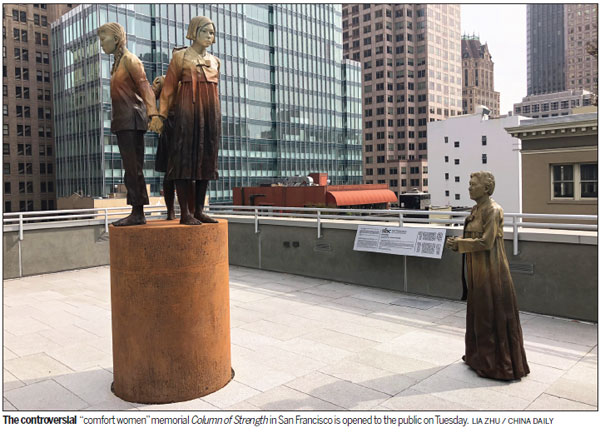'Comfort women' shrine goes public

A statue dedicated to "comfort women", the term given to those who were forced into prostitution by the Japanese Imperial Army during World War II, was made accessible to the public on Tuesday in downtown San Francisco after being unveiled last month.
The statue was erected on a corner of a 6,000-square-foot rooftop garden owned by Lincoln Properties and Gemdale. The city took title of the property on Monday from its previous owners as a result of allowing the developers to build the building in exchange for creating more open space.
Now the garden has been annexed to St Mary's Square public park.
"It's part of San Francisco, no longer private. The Japanese government wanted the memorial to be behind closed doors in a private place, so nobody could see it," said Lillian Sing, co-chair of the Comfort Women Justice Coalition, an advocacy group spearheading the installment of the memorial.
"But we wanted to go public from day one," Sing continued. "This will be a public memorial in a public place where everybody can come and visit it. When cable cars come down the street, with bell ringing, the tourists will know there's public memorial for 'comfort women' in a public park."

The advocacy group had pursued a resolution for the memorial project before it was unanimously approved by the city's board of supervisors in 2015.
"One of the main issues that the Japanese were pushing was 'Do it privately, don't make it public'. We did. We did build it privately. The only difference is that today it becomes public," Julie Tang, co-chair of the Comfort Women Justice Coalition, told a gathering at the St Mary's Square Annex.
A plaque with an inscription in five languages - English, Japanese, Chinese, Korean and Tagalog - was also installed beside the statue.
"This monument bears witness to the suffering of hundreds of thousands of women and girls euphemistically called 'Comfort Women,' who were sexually enslaved by the Japanese Imperial Armed Forces in 13 Asian-Pacific countries from 1931 to 1945," the inscription reads.
"Most of these women died during their wartime captivity," it continues. "This dark history was largely hidden for decades until the 1990s, when the survivors courageously broke their silence. They helped move the world to declare that sexual violence as a strategy of war is a crime against humanity for which governments must be held accountable."
Tang said in Austria a "comfort women" statue was built along with a similar plaque describing the history of "comfort women". But under pressure from the Japanese government, the plaque was removed so now visitors don't know what the statue is about, she said.
"That's what the Japanese government wants to do - mitigate, downplay those real issues," said Tang. "But here all the tourists will understand what this is about. Every day, there will be some tourists coming here and the word will spread."
The life-sized bronze statue called Column of Strength includes four figures: the late Hak-soon Kim, who was the first former "comfort woman" to break the silence in 1991, as she looks at three girls in traditional Korean, Chinese and Filipino dress holding hands on top of a pedestal, facing away from each other.
liazhu@chinadailyusa.cm
















